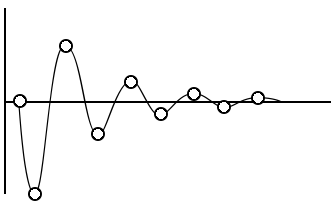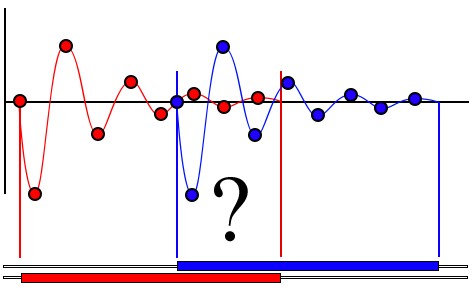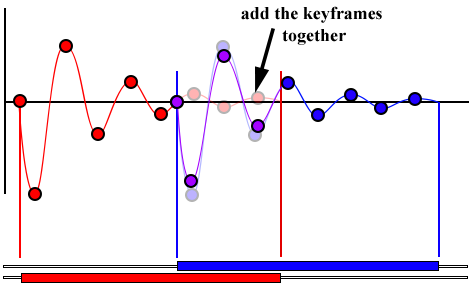21 | 22 | ## Projectile 23 | 24 | Pre-defined animation code that emulates a projectile launching. Smart caching feautres to only use enough objects to animate all projectiles. 25 | 26 | The collection that you assign this instrument type to is the "funnel" collection, or where you want the projectiles to initally start from. 27 | 28 | ### Instrument level features: 29 | * Projectile Collection (where the projectile objects get stored) 30 | * Reference Projectile (the object that gets copied to create the projectiles) 31 | * Use Inital Location (whether or not to use the initial location of the projectile curves) 32 | * Use Angle Based Location: 33 | * This allows you to use external objects to determine the angle of the projectile. 34 | * Offset (in degrees) 35 | * Location Collection (where the angle objects get stored. Must also have proper note numbers for each cooresponding funnel) 36 | 37 | ### Object level features: 38 | * Note input (both MIDI note (60) and Note Name (C3) supported) 39 | * Projectile Curve (the reference curves that get copied to create the projectiles) 40 | * Hit Time (where the ball hits the object. This will offset the animation in frames. - for earlier, + for later.) 41 | 42 |
43 | 44 | ## Custom: 45 | 46 | Defined by user, class and other parameters passed in via `addInstrument()`. 47 | More details coming soon. 48 | 49 | ```{note} 50 | More animation types will be added in the future. 51 | ``` 52 | -------------------------------------------------------------------------------- /docs/general/breakdown.md: -------------------------------------------------------------------------------- 1 | # Breakdown 2 | 3 | ## How do we drive music animation? 4 | 5 | There are 2 different approaches to driving a music animation: 6 | 7 | 1. FFT based approach- where you input an audio file (.wav, .mp3, etc) and have the visual elements react to the audio data. The audio data is filtered with steep inverse notch filters on selected frequencies. With the filtered data, you can then use the amplitude of the signal to drive animation parameters. This feature is [built into Blender.](https://docs.blender.org/manual/en/latest/editors/graph_editor/fcurves/editing.html#bake-sound-to-f-curves) 8 | 9 | 2. Preactive approach using a MIDI file. A MIDI file is read in and broken down into its components. Animation curves get “copied” throughout the duration of the MIDI file, based on sets of parameters, typically determined by the notes in the MIDI file. The MIDI file determines when animations are being copied. This is the way MIDIAnimator works. 10 | 11 | ## Process of creating a MIDI animation with MIDIAnimator (front/backend): 12 | MIDI files are broken down using the `MIDIFile()` class. `MIDIFile()` takes 1 parameter, which is the file where the MIDI file is stored. 13 | 14 | `MIDIFile()` will create `MIDITrack()`, `MIDINote()` and `MIDIEvent()` objects based on the data inside of the MIDI file. 15 | 16 | Structure of a `MIDIFile()` object: 17 | 18 | ``` 19 | MIDIFile: 20 | file: string (where the MIDI file is stored) 21 | tracks: list of MIDITrack objects 22 | 23 | MIDITrack: 24 | name: string 25 | notes: list of MIDINote objects 26 | control change: associative array that maps a control change number to a list of MIDIEvent values 27 | aftertouch: list of MIDIEvent values 28 | pitchwheel: list of MIDIEvent values 29 | 30 | MIDINote: 31 | channel: integer 32 | noteNumber: integer 33 | velocity: integer 34 | timeOn: float, in seconds 35 | timeOff: float, in seconds 36 | 37 | MIDIEvent: 38 | channel: integer 39 | value: float 40 | time: float, in seconds 41 | ``` 42 | 43 | To get specific `MIDITrack` objects, use the `MIDIFile.findTrack()` method. 44 | 45 | To start adding instruments, instance a `MIDIAnimatorNode()` object 46 | 47 | * Use the `MIDIAnimatorNode.addInsturment()` method to add an instrument. 48 | * Takes a `MIDITrack`, `bpy.types.Collection`. 49 | 50 | Call the `MIDIAnimatorNode.animate()` method to animate all instruments. 51 | 52 | * Given each instrument in the `MIDIAnimatorNode()` instruments list: 53 | * `preAnimate()` is called 54 | * `pass` by default. 55 | * `instrument.animate()` gets called for every note in the MIDIFile 56 | * Takes note and caclulates its keyframe data for it (applies time mappers, velocity, etc.) 57 | * Adds together in the list of already created keyframes 58 | 59 | ## Dealing with overlapping animation: 60 | In Figure A, we are given a simple dampened oscillation function. 61 | 62 |
63 |  64 |
65 | *Figure A, simple dampened oscillation*
66 |
64 |
65 | *Figure A, simple dampened oscillation*
66 |
67 |
68 | If we were to animate Figure A using a simple MIDI file (2 notes, with the notes overlapping), it would look something like Figure B.
69 |
70 | However, there is a fundamental problem, as there is overlapping animation (denoted by the question mark in Figure B).
71 |
72 |  64 |
65 | *Figure A, simple dampened oscillation*
66 |
64 |
65 | *Figure A, simple dampened oscillation*
66 |
73 |  74 |
75 | *Figure B, animation duplicated across timeline*
76 |
74 |
75 | *Figure B, animation duplicated across timeline*
76 |
77 |
78 |
79 | To deal with the overlapping animation, we can simply add the 2 animation curves together, shown in Figure C.
80 |
81 |  74 |
75 | *Figure B, animation duplicated across timeline*
76 |
74 |
75 | *Figure B, animation duplicated across timeline*
76 |
82 |  83 |
84 | *Figure C, resulting animation curve*
85 |
83 |
84 | *Figure C, resulting animation curve*
85 |
86 |
87 |
88 | ### Problems with this approach:
89 | If the motion is not oscillating, the motion will be added together, in a result which is not desirable.
90 | More techniques in dealing with overlapping animation will need to be researched.
91 |
--------------------------------------------------------------------------------
/docs/general/future_plans.md:
--------------------------------------------------------------------------------
1 | # Future Plans
2 |
3 | - Future roadmap can be found [here](https://github.com/jamesa08/MIDIAnimator/projects).
--------------------------------------------------------------------------------
/docs/general/installation.md:
--------------------------------------------------------------------------------
1 | (installation)=
2 |
3 | # Installation
4 |
5 | You will need to install Blender (version 3.0 or better) to use MIDI Animator.
6 |
7 | ## Download
8 | Download the `.zip` file in the Releases pane, or click [here.](https://github.com/imacj/MIDIAnimator/releases)
9 |
10 | ```{admonition} Warning
11 | :class: danger
12 |
13 | Do NOT unzip the file. If the zip file is unzipped, the add-on will install improperly.
14 | ```
15 |
16 | ## Install
17 | In Blender, go to Edit -> Preferences
18 |
19 | 
20 |
21 | Next, go to Add-ons -> Install...
22 |
23 | 
24 |
25 | Locate the `.zip` file.
26 |
27 | Make sure to enable the add-on by pressing the checkbox.
28 | 
29 |
30 | *Volia!* You have now successfully installed MIDI Animator. You should see the "MIDIAnimator" tab now in the 3D viewport.
31 |
32 | 
33 |
34 |
35 | ## Next Steps
36 | - **Check out the [Getting Started](/general/getting_started.md) page.**
37 | - **Do the [simple tutorial](/tutorials/tutorial.md).**
38 | - **Do the [advanced tutorial](/tutorials/adv_tutorial.md).**
39 |
--------------------------------------------------------------------------------
/docs/images/breakdown_figurea.png:
--------------------------------------------------------------------------------
https://raw.githubusercontent.com/jamesa08/MIDIAnimator/8463ea5b1931311f0d30803ccd992111a32ca9c7/docs/images/breakdown_figurea.png
--------------------------------------------------------------------------------
/docs/images/breakdown_figureb.png:
--------------------------------------------------------------------------------
https://raw.githubusercontent.com/jamesa08/MIDIAnimator/8463ea5b1931311f0d30803ccd992111a32ca9c7/docs/images/breakdown_figureb.png
--------------------------------------------------------------------------------
/docs/images/breakdown_figurec.png:
--------------------------------------------------------------------------------
https://raw.githubusercontent.com/jamesa08/MIDIAnimator/8463ea5b1931311f0d30803ccd992111a32ca9c7/docs/images/breakdown_figurec.png
--------------------------------------------------------------------------------
/docs/images/cube_anim_note_anchor_pt.png:
--------------------------------------------------------------------------------
https://raw.githubusercontent.com/jamesa08/MIDIAnimator/8463ea5b1931311f0d30803ccd992111a32ca9c7/docs/images/cube_anim_note_anchor_pt.png
--------------------------------------------------------------------------------
/docs/images/cube_anim_properties.png:
--------------------------------------------------------------------------------
https://raw.githubusercontent.com/jamesa08/MIDIAnimator/8463ea5b1931311f0d30803ccd992111a32ca9c7/docs/images/cube_anim_properties.png
--------------------------------------------------------------------------------
/docs/images/cube_note_example.png:
--------------------------------------------------------------------------------
https://raw.githubusercontent.com/jamesa08/MIDIAnimator/8463ea5b1931311f0d30803ccd992111a32ca9c7/docs/images/cube_note_example.png
--------------------------------------------------------------------------------
/docs/images/cube_sorting_sort_name.png:
--------------------------------------------------------------------------------
https://raw.githubusercontent.com/jamesa08/MIDIAnimator/8463ea5b1931311f0d30803ccd992111a32ca9c7/docs/images/cube_sorting_sort_name.png
--------------------------------------------------------------------------------
/docs/images/cube_sorting_syntax.png:
--------------------------------------------------------------------------------
https://raw.githubusercontent.com/jamesa08/MIDIAnimator/8463ea5b1931311f0d30803ccd992111a32ca9c7/docs/images/cube_sorting_syntax.png
--------------------------------------------------------------------------------
/docs/images/inst_1.png:
--------------------------------------------------------------------------------
https://raw.githubusercontent.com/jamesa08/MIDIAnimator/8463ea5b1931311f0d30803ccd992111a32ca9c7/docs/images/inst_1.png
--------------------------------------------------------------------------------
/docs/images/inst_2.png:
--------------------------------------------------------------------------------
https://raw.githubusercontent.com/jamesa08/MIDIAnimator/8463ea5b1931311f0d30803ccd992111a32ca9c7/docs/images/inst_2.png
--------------------------------------------------------------------------------
/docs/images/inst_3.png:
--------------------------------------------------------------------------------
https://raw.githubusercontent.com/jamesa08/MIDIAnimator/8463ea5b1931311f0d30803ccd992111a32ca9c7/docs/images/inst_3.png
--------------------------------------------------------------------------------
/docs/images/inst_4.png:
--------------------------------------------------------------------------------
https://raw.githubusercontent.com/jamesa08/MIDIAnimator/8463ea5b1931311f0d30803ccd992111a32ca9c7/docs/images/inst_4.png
--------------------------------------------------------------------------------
/docs/index.md:
--------------------------------------------------------------------------------
1 | [contributors-shield]: https://img.shields.io/github/contributors/imacj/MIDIAnimator.svg?style=flat
2 | [contributors-url]: https://github.com/imacj/MIDIAnimator/graphs/contributors
3 | [forks-shield]: https://img.shields.io/github/forks/imacj/MIDIAnimator.svg?style=flat
4 | [forks-url]: https://github.com/imacj/MIDIAnimator/network/members
5 | [stars-shield]: https://img.shields.io/github/stars/imacj/MIDIAnimator.svg?style=flat
6 | [stars-url]: https://github.com/imacj/MIDIAnimator/stargazers
7 | [issues-shield]: https://img.shields.io/github/issues/imacj/MIDIAnimator.svg?style=flat
8 | [issues-url]: https://github.com/imacj/MIDIAnimator/issues
9 | [license-shield]: https://img.shields.io/github/license/imacj/MIDIAnimator.svg?style=flat
10 | [license-url]: https://github.com/imacj/MIDIAnimator/blob/master/LICENSE.txt
11 | [product-screenshot]: images/screenshot.png
12 |
13 | # MIDI Animator
14 |
15 | ```{note}
16 | This project is under active development. These documents are subject to change, and things may have unexpected results.
17 |
18 | Documentation is unfinished and is always being updated.
19 | ```
20 |
21 | [![Contributors][contributors-shield]][contributors-url]
22 | [![Forks][forks-shield]][forks-url]
23 | [![Stargazers][stars-shield]][stars-url]
24 | [![Issues][issues-shield]][issues-url]
25 | [![GNU License][license-shield]][license-url]
26 |
27 | ## About the project:
28 | **MIDI Animator** aims to provide a cohesive, open-source solution to animating instruments using a MIDI file.
29 |
30 | ```{admonition} Note
31 |
32 |
33 | Currently unsupported:
34 | - Sustaining notes
35 | - Using MIDI CC data & pitchwheel data
36 | - Bones (for rigs). Only object parent trees are supported
37 |
38 | ```
39 |
40 | *You can download an offline version of the docs [here.](https://midianimatordocs.readthedocs.io/_/downloads/en/latest/pdf/)*
41 |
42 | ## Getting Started:
43 |
44 | Check out how to [install](general/installation.md) the project. See {ref}`getting_started` to get started.
45 |
46 | ## Contributing
47 |
48 | Contributions are what make the open source community such an amazing place to learn, inspire, and create. Any contributions you make are **greatly appreciated**.
49 |
50 | If you have a suggestion that would make this better, please fork the repo and create a pull request. You can also simply open an issue with the tag "enhancement".
51 | Don't forget to give the project a star! Thanks again!
52 |
53 | 1. Fork the Project
54 | 2. Create your Feature Branch (`git checkout -b feature/AmazingFeature`)
55 | 3. Commit your Changes (`git commit -m 'Add some AmazingFeature'`)
56 | 4. Push to the Branch (`git push origin feature/AmazingFeature`)
57 | 5. Open a Pull Request
58 |
59 | ## License
60 |
61 | Distributed under the GNU General Public License (GPLv3) license.  83 |
84 | *Figure C, resulting animation curve*
85 |
83 |
84 | *Figure C, resulting animation curve*
85 | 62 | You may freely change and add to a forked repository as you wish, but you may **not** publish this software as closed source.
63 | _See `LICENSE.txt` for more information._
64 | 65 | ## Contact 66 | 67 | James Alt - [jalt@capital.edu](mailto:jalt@capital.edu) 68 | 69 | Project Link: [https://github.com/imacj/MIDIAnimator](https://github.com/imacj/MIDIAnimator) 70 | 71 | ## Acknowledgments 72 | 73 | Here are some of the development tools I used to create this project. 74 | 75 | - [Visual Studio Code](https://code.visualstudio.com) 76 | - [Blender Development Addon](https://marketplace.visualstudio.com/items?itemName=JacquesLucke.blender-development) 77 | - [Fake Blender Python API Module (for code completion)](https://github.com/nutti/fake-bpy-module) 78 | - [Blender Python API Documentation](https://docs.blender.org/api/2.91/) 79 | 80 | Thank you to David Reed, Professor of Computer Science at Capital University advising this project and assisting with algorithms and data structures. 81 | 82 | 83 | 84 | ```{toctree} 85 | :caption: Table of Contents 86 | :maxdepth: 1 87 | 88 | general/installation.md 89 | general/getting_started.md 90 | general/breakdown.md 91 | general/animation_types.md 92 | tutorials/tutorial.md 93 | tutorials/adv_tutorial.md 94 | general/future_plans.md 95 | ``` 96 | 97 | ```{toctree} 98 | :caption: API Reference 99 | :maxdepth: 1 100 | :glob: 101 | 102 | api/* 103 | 104 | ``` -------------------------------------------------------------------------------- /docs/make.bat: -------------------------------------------------------------------------------- 1 | @ECHO OFF 2 | 3 | pushd %~dp0 4 | 5 | REM Command file for Sphinx documentation 6 | 7 | if "%SPHINXBUILD%" == "" ( 8 | set SPHINXBUILD=sphinx-build 9 | ) 10 | set SOURCEDIR=source 11 | set BUILDDIR=build 12 | 13 | if "%1" == "" goto help 14 | 15 | %SPHINXBUILD% >NUL 2>NUL 16 | if errorlevel 9009 ( 17 | echo. 18 | echo.The 'sphinx-build' command was not found. Make sure you have Sphinx 19 | echo.installed, then set the SPHINXBUILD environment variable to point 20 | echo.to the full path of the 'sphinx-build' executable. Alternatively you 21 | echo.may add the Sphinx directory to PATH. 22 | echo. 23 | echo.If you don't have Sphinx installed, grab it from 24 | echo.http://sphinx-doc.org/ 25 | exit /b 1 26 | ) 27 | 28 | %SPHINXBUILD% -M %1 %SOURCEDIR% %BUILDDIR% %SPHINXOPTS% %O% 29 | goto end 30 | 31 | :help 32 | %SPHINXBUILD% -M help %SOURCEDIR% %BUILDDIR% %SPHINXOPTS% %O% 33 | 34 | :end 35 | popd 36 | -------------------------------------------------------------------------------- /docs/requirements.txt: -------------------------------------------------------------------------------- 1 | sphinx==4.5.0 2 | sphinx-rtd-theme==1.0.0 3 | 4 | myst-parser==0.17.2 # via my-st 5 | mypy-extensions==0.4.3 # via my-st 6 | mdit-py-plugins==0.3.0 # via my-st 7 | fake-bpy-module-latest 8 | numpy -------------------------------------------------------------------------------- /docs/tutorials/adv_tutorial.md: -------------------------------------------------------------------------------- 1 | 14 | 15 | # Advanced Tutorial 16 | 17 | ```{note} 18 | This section is under development. Check back later. 19 | ``` -------------------------------------------------------------------------------- /docs/tutorials/tutorial.md: -------------------------------------------------------------------------------- 1 | 13 | 14 | # Simple Tutorial 15 | 16 | ```{note} 17 | This section is under development. Check back later. 18 | ``` -------------------------------------------------------------------------------- /noteOffData.py: -------------------------------------------------------------------------------- 1 | from typing import List, Tuple 2 | from dataclasses import dataclass 3 | 4 | @dataclass 5 | class Keyframe: 6 | frame: float 7 | value: float 8 | 9 | def findOverlap(keyList1, keyList2): 10 | if len(keyList2) == 0: 11 | return [] 12 | 13 | if keyList1[0].frame > keyList2[0].frame: 14 | #this means a note is somehow going back in time? is this even possible? 15 | # notes should always be sequential, and not in reverse time 16 | raise ValueError("first keyframe in keyList1 is bigger than first keyframe in keyList2! Please open a issue on GitHub along with the MIDI file.") 17 | 18 | overlappingKeyList = [] 19 | overlapping = False 20 | for key1 in reversed(keyList1): 21 | # print ("testing case key1={keyl.frame} and key2={keyList2[0].frame}") 22 | if key1.frame > keyList2[0].frame: 23 | overlapping = True 24 | overlappingKeyList.append(key1) 25 | else: 26 | # not overlapping 27 | if overlapping: 28 | overlappingKeyList.append(key1) 29 | break 30 | 31 | return list(reversed(overlappingKeyList)) 32 | 33 | def getValue(key1: Keyframe, key2: Keyframe, frame: float) -> float: 34 | x1, y1 = key1.frame, key1.value 35 | x2, y2 = key2.frame, key2.value 36 | try: 37 | m = (y2 - y1) / (x2 - x1) 38 | except ZeroDivisionError: 39 | # i dont know if this will work every time 40 | m = 0 41 | 42 | c = y1 - m * x1 43 | return (m * frame) + c 44 | 45 | def interval(keyList, frame): 46 | if len(keyList) == 0: 47 | return (None, None) 48 | if keyList[0].frame > frame: 49 | # out of range to the left of the list 50 | return (keyList[0], keyList[0]) 51 | elif keyList[-1].frame < frame: 52 | # out of range to the right of the list 53 | return (keyList[-1], keyList[-1]) 54 | 55 | for i in range(len(keyList)): 56 | if keyList[i].frame <= frame <= keyList[i+1].frame: 57 | return (keyList[i], keyList[i+1]) 58 | 59 | 60 | x = 0 61 | keyList1 = [Keyframe(frame=59, value=0.0), Keyframe(frame=74, value=0.5), Keyframe(frame=77, value=0.5), Keyframe(frame=92, value=0.0)] 62 | keyList2 = [Keyframe(frame=89-x, value=0.0), Keyframe(frame=104-x, value=0.5), Keyframe(frame=107-x, value=0.5), Keyframe(frame=122-x, value=0.0)] 63 | 64 | keyList1Overlapping = findOverlap(keyList1, keyList2) 65 | 66 | key1InterpolatedValues = [] 67 | key2InterpolatedValues = [] 68 | 69 | # interpolate the keyframes for each graph 70 | for key2 in keyList2: 71 | key1interval1, key1interval2 = interval(keyList1Overlapping, key2.frame) 72 | if key1interval1 is None and key1interval2 is None: 73 | continue 74 | key2InterpolatedValues.append(Keyframe(key2.frame, getValue(key1interval1, key1interval2, key2.frame))) 75 | 76 | for key1 in keyList1Overlapping: 77 | key2interval1, key2interval2 = interval(keyList2, key1.frame) 78 | if key2interval1 is None and key2interval2 is None: 79 | continue 80 | key1InterpolatedValues.append(Keyframe(key1.frame, getValue(key2interval1, key2interval2, key1.frame))) 81 | 82 | # now add the keyframe values together (the most important part) 83 | for key1, key1Interp in zip(keyList1Overlapping, key1InterpolatedValues): 84 | key1.value += key1Interp.value 85 | 86 | for key2, key2Interp in zip(keyList2, key2InterpolatedValues): 87 | key2.value += key2Interp.value 88 | 89 | # extend the lists (need a better method to ensure the keyframes before get cut off and then start ) 90 | keyList1Overlapping.extend(keyList2) 91 | 92 | keyList1Overlapping.sort(key=lambda x: x.frame) 93 | 94 | print("x, y") 95 | for key in keyList1Overlapping: 96 | print(f"{key.frame}, {key.value}") 97 | 98 | 99 | 100 | -------------------------------------------------------------------------------- /pyproject.toml: -------------------------------------------------------------------------------- 1 | [build-system] 2 | requires = ["flit_core >=3.2,<4"] 3 | build-backend = "flit_core.buildapi" -------------------------------------------------------------------------------- /readthedocs.yaml: -------------------------------------------------------------------------------- 1 | version: 2 2 | 3 | sphinx: 4 | configuration: docs/conf.py 5 | 6 | python: 7 | install: 8 | - requirements: docs/requirements.txt 9 | 10 | submodules: 11 | include: all 12 | recursive: true 13 | 14 | build: 15 | os: ubuntu-22.04 16 | tools: 17 | python: "3.11" 18 | jobs: 19 | pre_create_environment: 20 | - echo "Update autodocs" 21 | - python3 docs/build_api_docs.py -f -o docs/api MIDIAnimator -------------------------------------------------------------------------------- /rust-impl/blender-addon/__init__.py: -------------------------------------------------------------------------------- 1 | # This program is free software; you can redistribute it and/or modify 2 | # it under the terms of the GNU General Public License as published by 3 | # the Free Software Foundation; either version 3 of the License, or 4 | # (at your option) any later version. 5 | # 6 | # This program is distributed in the hope that it will be useful, but 7 | # WITHOUT ANY WARRANTY; without even the implied warranty of 8 | # MERCHANTABILITY or FITNESS FOR A PARTICULAR PURPOSE. See the GNU 9 | # General Public License for more details. 10 | # 11 | # You should have received a copy of the GNU General Public License 12 | # along with this program. If not, see